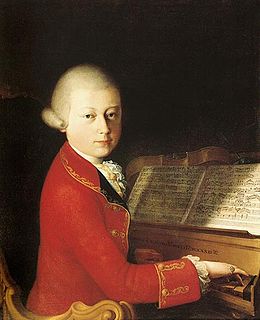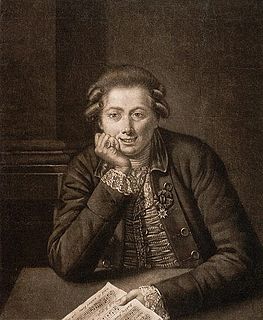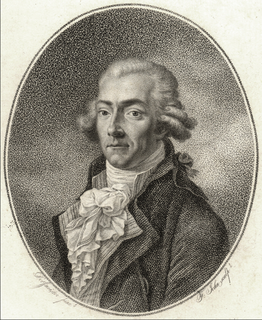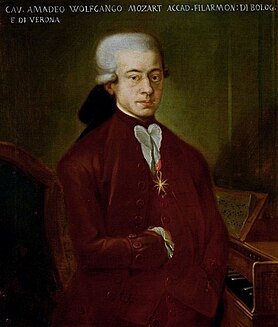
Senesino was a celebrated Italian contralto castrato, particularly remembered today for his long collaboration with the composer George Frideric Handel.

Maria Aloysia Antonia Weber Lange was a German soprano, remembered primarily for her association with the composer Wolfgang Amadeus Mozart.

Theo Adam was a German operatic bass-baritone and bass singer who had international career in opera, concert and recital from 1949. He was a member of the Staatsoper Dresden for his entire career, and sang at the Bayreuth Festival from 1952 to 1980. He particularly excelled in portraying roles by Richard Wagner, especially Wotan in Der Ring des Nibelungen, which he also performed at the Metropolitan Opera, among others. In concert, he was a much admired Bach singer and also drew acclaim for his interpretation of the title character of Mendelssohn's Elijah. He was a voice teacher at the Musikhochschule Dresden.
The Nannerl Notenbuch, or Notenbuch für Nannerl is a book in which Leopold Mozart, from 1759 to about 1764, wrote pieces for his daughter, Maria Anna Mozart, to learn and play. His son Wolfgang also used the book, in which his earliest compositions were recorded. The book contains simple short keyboard pieces, suitable for beginners; there are many anonymous minuets, some works by Leopold, and a few works by other composers including Carl Philipp Emanuel Bach and the Austrian composer Georg Christoph Wagenseil. There are also some technical exercises, a table of intervals, and some modulating figured basses. The notebook originally contained 48 bound pages of music paper, but only 36 pages remain, with some of the missing 12 pages identified in other collections.
The Symphony No. 28 in C major, K. 200/189k, by Wolfgang Amadeus Mozart is his last piece in the "Salzburg series". The date of composition is uncertain; it probably dates from 17 or 12(?) November 1774 or 1773(?).

Benedikt Emanuel Schack was a composer and tenor of the Classical era, a close friend of Mozart and the first performer of the role of Tamino in Mozart's opera The Magic Flute.

The celebrated composer Wolfgang Amadeus Mozart was raised a Roman Catholic, and the church played an important role in his life.

Josepha Duschek (1754–1824) was an outstanding soprano of the Classical era. She was a friend of Wolfgang Amadeus Mozart, who wrote a few works for her to sing.
Vincenzo dal Prato was an Italian soprano castrato singer, famous for his work with Mozart.
Wolfgang Amadeus Mozart died after a short illness on 5 December 1791, aged 35. His reputation as a composer, already strong during his lifetime, rose rapidly in the years after his death, and he became one of the most celebrated of all composers.

Between 1769 and 1773, the young Wolfgang Amadeus Mozart and his father Leopold Mozart made three Italian journeys. The first, an extended tour of 15 months, was financed by performances for the nobility and by public concerts, and took in the most important Italian cities. The second and third journeys were to Milan, for Wolfgang to complete operas that had been commissioned there on the first visit. From the perspective of Wolfgang's musical development the journeys were a considerable success, and his talents were recognised by honours which included a papal knighthood and memberships in leading philharmonic societies.

Teresa Saporiti was an Italian operatic soprano and composer most remembered today for creating the role of Donna Anna in Mozart's opera Don Giovanni. She was born in Milan and died there at the age of 106. In her later years, she was often referred to by her married name, Teresa Saporiti-Codecasa.

The Missa brevis No. 9 in B-flat major by Wolfgang Amadeus Mozart, K. 275/272b, was probably written before September 1777 for Salzburg. The mass is scored for SATB soloists, SATB choir, violin I, violin II, 3 trombones, string bass, and organ.

The Sparrow Mass is a mass in C major K. 220/196b, Mass No. 9, Missa brevis No. 5, composed by Wolfgang Amadeus Mozart in 1775 or 1776 in Salzburg. The mass is sometimes termed a missa brevis et solemnis, because it is short in a simple structure as a missa brevis, but festively scored like a missa solemnis with brass and timpani in addition to four soloists, strings and organ. It was possibly first performed on 7 April 1776 in a mass for Easter at the Salzburg Cathedral. The nickname is derived from violin figures in the Hosanna which resemble bird chirping.

Giusto Fernando Tenducci, sometimes called "il Senesino", was a soprano (castrato) opera singer and composer, who passed his career partly in Italy but chiefly in Britain.

Francesco Benucci was an outstanding Italian bass/baritone singer of the 18th century. He sang a number of important roles in the operas of Wolfgang Amadeus Mozart and other composers.
This article discusses the nationality of the composer Wolfgang Amadeus Mozart (1756–1791).















